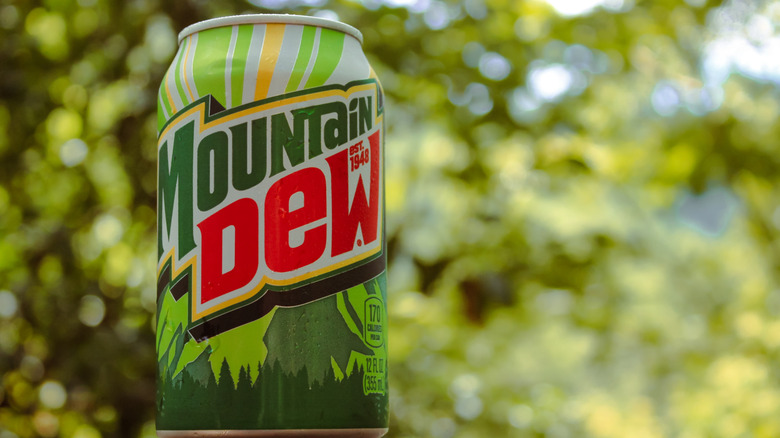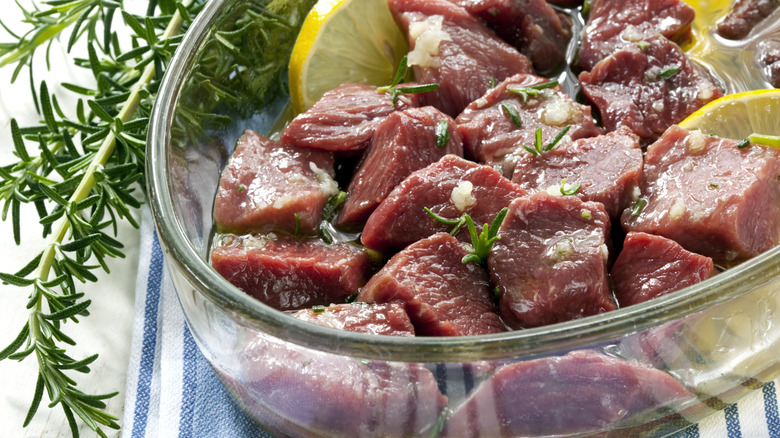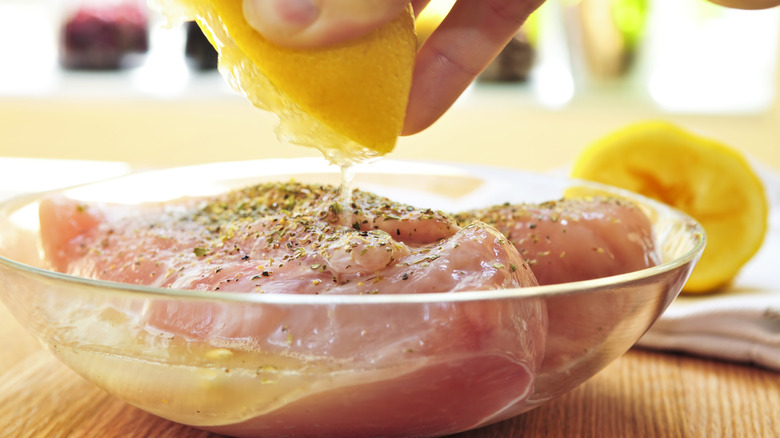Mountain Dew Is The Secret Ingredient For Tender Meat
If you're ever craving juicy, melt-in-your-mouth meat, the truth is, you don't need to buy the most expensive cut. One of the most famous hacks for tenderizing meat is using baking soda –- aka velveting. You could also cover your meat in a salt brine, or use fruits like papaya, kiwi, or pineapple in a marinade, whose enzymes break down the proteins in meat. A more unconventional tenderizing trick comes from a surprising source: Mountain Dew. To learn more about why this soft drink is such a good tenderizer — and how to use it — Food Republic spoke with John Politte, owner and executive chef of It's Only Food.
Although Mountain Dew isn't the most conventional tenderizer, if you take a closer look at its ingredients, it's no surprise that it works. According to Politte, "Mountain Dew helps tenderize meat because it contains citric acid." Acids tenderize meat, so Mountain Dew can work just as well as other acidic marinades — such as yogurt in a chicken tikka or lemon juice in Greek-style roasts. These acids cause the proteins in the meat's muscle fibers to unravel — a process known as protein denaturation. This allows the meat to become more tender and able to absorb flavors more easily. "It also has a lot of sugar, which can make the meat taste sweeter and help it brown while cooking," Politte added.
Mountain Dew can add both sweetness and juiciness to practically any meat, but is particularly suited towards "lean or tough meats that benefit from extra moisture and sweetness, especially poultry, pork, and select beef cuts," Politte told us.
How Mountain Dew affects texture and flavor
The length of time you marinate usually depends on what meat you're using. For lighter meats like fish, you'll only need 30 minutes to an hour, whereas for heavier red meats, you're looking at around a two-hour minimum, but it can be left for up to 24 hours. Keep in mind, according to John Politte, the sweet spot for a Mountain Dew marinade is two to six hours. While longer marinades are great for texture and flavor, acidity needs to be taken into account when it comes to setting a time. That's because acid can actually do more harm than good if it's left for too long, as it can break down the proteins to a point where the meat becomes mushy rather than tender.
"The drink's high sugar content adds a distinct sweetness, which can influence the overall flavor profile, making dishes taste sweeter than they otherwise would," Politte added. "Additionally, the citrus notes — primarily lemon and lime — can impart a bright, tangy element that may complement or contrast with other ingredients in the dish." With that in mind, you should use Mountain Dew sparingly so that it doesn't overwhelm the flavor profile of your dish, making sure to balance it out with other ingredients in the marinade. We recommend avoiding adding it to recipes where sweet, citrusy flavors would clash, and instead stick to flavorless tenderizers like plain yogurt or baking soda. Instead, "It is best used in recipes where a bit of sweetness and citrus go well with the flavors, like barbecue," Politte told us. Think Mountain Dew smoked ribs, or Mountain Dew buffalo chicken wings.
Other ingredients to add to a Mountain Dew marinade
Mountain Dew can do it all, from being the secret ingredient for perfect apple dumplings to forming the base of a super flavorful marinade. As it's such an unusual flavor addition, you can really create some unique blends with it. Who knows? It might become a regular staple.
To balance out its sweetness, you could pair Mountain Dew with contrasting flavors, such as savory, umami-rich ingredients. For an Asian-inspired twist, try pairing it with soy sauce, which "adds umani and saltiness," John Politte told us, or take a page from England's culinary tradition and add Worcestershire sauce, which brings out umami while also "[adding] depth and subtle tanginess," he added. And when talking about umami, you can't forget MSG, which — contrary to popular (and untrue) beliefs — is perfectly fine and a small sprinkle will quickly enhance the other flavors in your marinade.
For those who enjoy their eat on the spicier side, hot sauce or chili flakes "cuts through the sweetness," Politte explained. For the ultimate combo of sweet-and-spicy, you could also add hot honey, which will help bind the flavors together and whose sugars melt to brown and caramelize the meat during cooking. Remember, no marinade is complete without a strong base of aromatics, so grab your ginger and garlic — fresh is always best. According to Politte, the garlic "introduces a robust, aromatic depth," while the ginger "offers a zesty kick and complements citrus notes." Other aromatics to consider include lemon or lime zest, to brighten the flavors even further, alongside fresh herbs like "clinatro, parsley, or thyme," he recommended.



